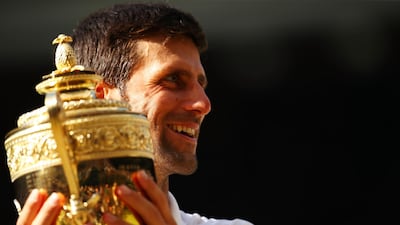On Sunday evening, inside the world's most prestigious tennis stadium, Novak Djokovic emphatically banished to the past what he concedes were the worst 12 months of his career.
The banishment came courtesy of his fourth Wimbledon title, his 13th grand slam title overall, following a typically ruthless straight sets win over South Africa's gentle giant Kevin Anderson.
Considering where Djokovic was physically and, perhaps more importantly, psychologically when he retired from his 2017 Wimbledon quarter-final, to come back and win the title is a remarkable achievement.
Then, Djokovic called time on his season and underwent elbow surgery, the after-effects of which were evident throughout the first half of this year when form, and thus wins, were hard to come by.
In reality, Djokovic's problems stretched further back than 12 months ago and contained more than a troublesome elbow. After achieving the career Grand Slam by winning the 2016 French Open, the Serbian's form curiously slumped.
_____________
Read more:
Wimbledon title propels Novak Djokovic back in top 10
Djokovic crushes Anderson to clinch fourth Wimbledon title
Angelique Kerber backed to complete career Grand Slam
Serena Williams' husband proud of her Wimbledon run
_____________
In the 26 months between the Roland Garros and Wimbledon triumphs, Djokovic claimed just two titles and only one of significance - the 2016 Canadian Masters. For a player who had claimed 48 titles between 2011 and 2015, it was an alarming downturn.
There were acrimonious coaching splits and rumours regarding a lack of motivation and problems in his personal life. The player himself conceded in his courtside interview on Sunday that there were "many moments of doubt" over whether he could scale his previous heights.
All of which serves to highlight just how impressive Djokovic's achievement at Wimbledon was - an achievement that deserves the full adoration of the tennis public.
Yet the reaction to Djokovic's success, while no doubt celebrated and respected, has not been met with the same unbridled joy extended to Roger Federer and Rafael Nadal for each of their combined 37 major wins.
It's always been this way for Djokovic - one of the sport's greatest champions who has never fully captured the hearts of tennis fans.
Interestingly, his former coach, Boris Becker, brought up the point on Sunday.
"Is he shown the same respect as the big two? Probably not. We all love Roger and we all love Rafa, but it seems we "respect" Djokovic," the former three-time Wimbledon champion said.
"That's something that bothers him. He wants to be on the same level, but it's something you can't buy. He's playing in an era with two of the most beloved sportspeople in the world. That's the situation but he has to deal with it. Fans aren't against him though."
That's just it: most tennis fans like Djokovic and appreciate his wonderful talents but he has never achieved the "beloved" status of Federer and Nadal.
But why? The Serbian is likable, charismatic, and has a good sense of humour. He has always been generous with his time for fans and the media, and of course he is one of the finest players in history.
Part of it may be down to timing. When Djokovic expanded the "Big Two" to the "Big Three" he did so by gatecrashing the most enthralling rivalry of the modern era.
Passionate tennis fans had already picked their sides in the Federer-Nadal duel, choosing on which mast to nail their colours based on the style and persona they were drawn to.
Were you blown away by the athleticism, power and work rate of Nadal? Then that was your man. Or was Federer's elegance, swagger and effortlessness more to your liking? Then Team Fed all the way.
All of a sudden there was this third player, the dynamic of the rivalry changed, and with fans so emotionally invested in Federer and Nadal, who was there left to make up Team Djokovic?
Sport needs rivalries so when Federer and Nadal wavered for a few years from 2011 onwards, Djokovic was largely left alone as tennis' dominant force. With no deserving rival until Andy Murray became a consistent adversary, he racked up an astounding number of titles and records, all of which will go down in tennis history, but did little to capture the imaginations of tennis fans.
Then there is Djokovic's playing style. It's easy to be left in awe of Federer, even for non-tennis followers: a blend of finesse, grace and power marks the Swiss out as the most stylish player the game has ever produced.
Even Nadal, who does not possess Federer's skillset but can still leave packed stadiums mesmerised by his shot-making ability. Djokovic's unrivalled return game, remarkable defence and counter-attacking brilliance does not often translate to edge-of-the-seat tennis.
To make it perfectly clear, Djokovic is by no means a neglected champion. He has passionate and dedicated fans around the world, but there is certainly a bit of an emotional disconnect with the wider tennis public and the casual follower of the sport.
Considering his talents and achievements stack up alongside Federer and Nadal, he has a right to wonder why he is not held in the same regard.
At the age of 31 and having won everything in the game, there is precious more he can do. Perhaps Djokovic will have to settle for "respect" after all.

